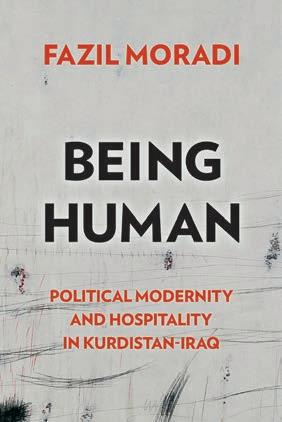
1 minute read
Destroy Them Gradually
Displacement as Atrocity
ANDREW R. BASSO
Perpetrators of mass atrocities have used displacement to transport victims to killing sites or extermination camps to transfer victims to sites of forced labor and attrition, to ethnically homogenize regions by moving victims out of their homes and lands, and to destroy populations by depriving them of vital daily needs. Displacement has been treated as a corollary practice to crimes committed, not a central aspect of their perpetration. Destroy Them Gradually examines four cases that illuminate why perpetrators have destroyed populations using displacement policies: Germany’s genocide of the Herero (1904–1908); Ottoman genocides of Christian minorities (1914–1925); expulsions of Germans from East/ Central Europe (1943–1952); and climate violence (twenty-first century). Because displacement has been typically framed as a secondary aspect of mass atrocities, existing scholarship overlooks how perpetrators use it as a means of executing destruction rather than a vehicle for moving people to a specific location to commit atrocities.
ANDREW R. BASSO is affiliated with the Laurier Institute for the Study of Public Opinion and Policy and Wilfrid Laurier University. He is the coauthor of From Bureaucracy to Bullets: Extreme Domicide and the Right to Home (Rutgers University Press).
Being Human
Political Modernity and Hospitality in Kurdistan-Iraq
FAZIL MORADI
Being Human: Genocide and Hospitality in Kurdistan-Iraq examines the Iraqi Ba’th state and the al-Anfal operations as one of the twentieth century’s ultimate acts of the destruction of humanity. It remains the first and only crime of state in the Middle East to be tried under the 1948 UN Genocide Convention, the 1950 Nuremberg Principles, and the 1969 Iraqi Penal Code and to be recognized as genocide, crimes against humanity, and war crimes in Baghdad between 2006 and 2007. Being Human gathers together social sciences, humanities, and the arts to understand modern state violence and its afterlife. It is a work of anthropological hospitality, returning to the violence of political modernity only to turn to the human survivors’ hospitality, infinite pursuit of justice, and acts of translation—testimonial narratives, law, politics, archive, poetry, artworks, museums, and memorial and symbolic cemeteries in the Kurdistan Region of Iraq.

FAZIL MORADI is a visiting associate professor in the Faculty of Humanities, Johannesburg Institute for Advanced Study, University of Johannesburg; an associate researcher at the Institute for Social Anthropology, Austrian Academy of Sciences; and an affiliated scholar at the Center for the Study of the Holocaust, Genocide, and Crimes against Humanity at the Ralph Bunche Institute for International Studies, Graduate Center—CUNY.
292 pp 1 b/w photo, 17 tables
6.125 x 9.25
978-1-9788-3128-5 cloth $89.95SU
February 2024
Human Rights • Genocide Political Science
210 pp 18 b/w images 6 x 9
978-1-9788-3169-8 paper $34.95S
978-1-9788-3170-4 cloth $130.00SU
January 2024
Human Rights • Genocide Middle Eastern Studies



